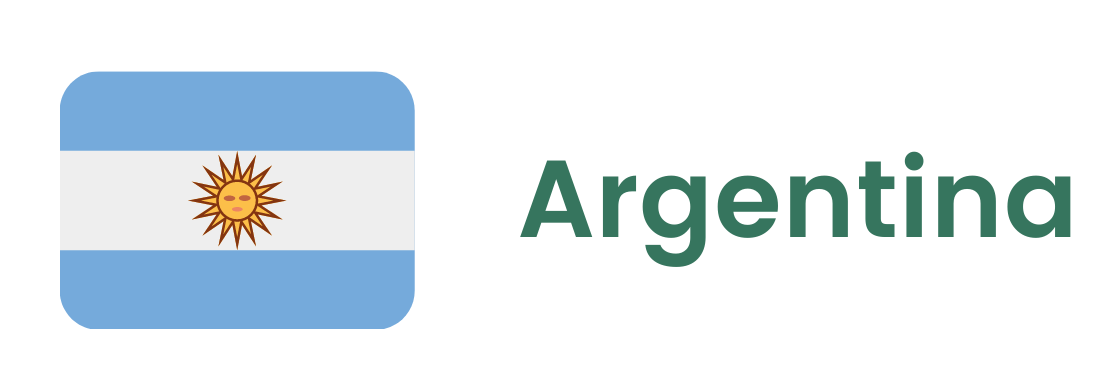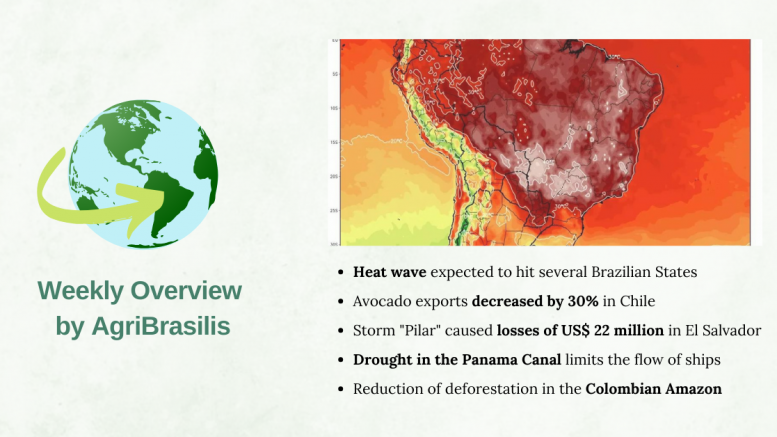Argentina used Chinese yuan to pay part of the US$ 2.6 billion owed to the International Monetary Fund

Argentina’s wheat production estimate for the 2023/24 season was reduced to 13.5 million tonnes, due to the adverse weather conditions. Rains happened too late in several producing regions, and did compensate for “the drought that prevailed in most areas of Argentina until October 20th, as well as the effect of late frosts”. (Bolsa de Rosário)
Wine production in Argentina reached just 8.8 million hectoliters, a decrease of 23% when compared to the previous year. This represents one of the lowest volumes ever recorded. In Chile, the largest producer in the southern hemisphere, the volume of wine is 20% lower than the previous year, with the harvest seriously affected by forest fires and drought. (International Vine and Wine Organization)
Four meteorological stations in Argentina recorded maximum temperatures. The Orán station, in Salta, recorded 43.9ºC, a new absolute maximum. The Chamical station, in La Rioja, reached a maximum of 43ºC, which set a new record for the month. The historical series has records since 1962. (Metsul Meteorologia)
Argentina used Chinese yuan to pay part of the US$ 2.6 billion owed to the International Monetary Fund in October. The swap deal with China helped Argentina overcome a foreign exchange shortage as key agricultural exports fell sharply due to the drought. (Ministry of Economy)

Drought affects 80 thousand families and 25 thousand agricultural hectares, in 70 municipalities in the country. (Minister of Rural Development and Lands)

For the first time, Petrobras processed soybean oil in a refinery. For the president of Petrobras, Jean Paul Prates, the transition to sustainable energy is a “path of no return” for the company. “We are making typical petroleum derivatives, but from vegetable oil. This is innovation and energy transition combined for the benefit of Brazil”, said Prates. (Petrobras)
The Agriculture Committee of the Chamber of Deputies (Brazilian Lower House of Congress) approved a request to summon the minister of the environment, Marina Silva, asking her to explain measures adopted by the department that would imply “a clear persecution of Brazilian agriculture and its farmers”. “The minister’s arrival at this committee is extremely important to provide clarification on the clear persecution of Brazilian agribusiness and its farmers. We are seeing several statements and instruments being used against the sector. We cannot sit idly by”, according to congressman Rodolfo Nogueira. (Agência FPA)
It is estimated that 77% of cotton from the 2022/23 harvest was processed by November 2nd. Cotton lint prices, which reached U$ 0.81 per pound at the end of October, fell again at the beginning of November. According to Cepea researchers, this happened because of a decrease in international values and export parity. (Cepea; Abrapa)
In 2023, for the first time in history, the monthly average of pork exports exceeded 100 thousand tonnes. Foreign sales reached more than one million tonnes in October and are expected to break a new record by the end of the year. (ABPA)
The Minister of Agriculture, Carlos Fávaro, extended the country’s state of zoosanitary emergency for 180 days due to the highly pathogenic avian influenza virus in wild birds in Brazil. (MAPA)
Banco do Brasil extended credit for farmers in cities affected by the heavy rains in the State of Paraná, with the maintenance of initial financial charges. According to the institution, the process will be simplified and there will be individual analysis and monitoring of crops. The bank announced that it will provide credit of US$ 60.11 million. There will be US$ 32.8 million for the 15 municipalities in Paraná that are in a “situation of calamity” and US$ 27.3 million for the 16 municipalities in a “state of emergency”. (Banco do Brasil)
Heat wave is expected to hit several Brazilian States next week. Many cities may record 45ºC or more during the period. The data indicate temperatures well above average in Central Brazil. (Metsul Meteorologia)
SLC Agrícola obtained a net profit of US$ 34.07 million in the 3Q of 2023, reversing a net loss of US$ 15.95 million from the previous year. Net revenue grew 22% in the 3Q, compared to the same period of last year, due to higher volumes and prices. (SLC Agrícola)
According to Carlos Guedes, research manager of the Brazilian Institute of Geography and Statistics, in Brazil there will be a record harvest of soybean, corn, sorghum and cotton in 2023, but excessive rain in the southern region has reduced estimates for agricultural production, harming the performance of winter crops, especially wheat. “We observed an increase in rainfall in the southern region, and the winter crops have not yet been harvested… This excess rainfall is a hindrance”, said Guedes. (IBGE)


Estimated cherry harvest reduction to 95.4 million 5 kg boxes, due to rains in the O’Higgins and Bío Bío regions. (Asoex)
Avocado exports decreased by 30% during the 2022/23 season. The drop was because of frosts during the spring, in addition to the reduction in the planted area due to water scarcity. (IQonsulting)

According to Claudia Liliana Cortés, director of the Unidad de Planificación Rural Agropecuaria, “a big increase in soybean farming has been recorded since 2021, mainly in the eastern plain region. Excellent international prices and high demand allowed for more farmers to mobilize to plant this crop”. Soybean planted area grew by 86.7% in the country, when compared to 2022. (UPRA)
Estimated a reduction in deforestation of 70% in the Colombian Amazon in the first nine months of 2023, compared to the same period from last year, according to the minister of the environment, Susana Muhamad. The minister also warned that the drought could change this trend. (Ministry of the Environment)
Colombian coffee harvest grew 30% in October, reaching 1.15 million bags. Colombian coffee exports in October reached 906 thousand bags of 60 kg, a drop of 4% when compared to the same month in 2022. (FNC)
14 months left for coffee farmers to adapt to the new European Union legislation. The 18-month period for implementing traceability and georeferencing of coffee farms began in July of 2023. (FNC)

Tropical storm “Pilar” caused losses estimated at US$ 22 million in corn and bean farms. The storm affected 9% and 14% of the country’s corn and bean productive areas, respectively. The Salvadoran Chamber of Small and Medium Agricultural Producers (CAMPO) asked the Agrarian Development Bank (BFA) to analyze the situation and adopt measures to support farmers. “We are moving further away from the possibility of having food sovereignty… year after year we depend more on imports”, according to the president of CAMPO, Luis Treminio. (CAMPO)

The newly elected president of Ecuador, Daniel Noboa, has announced the banana export businessman, Franklin Danilo Palacios, as the future minister of agriculture. (Government of Ecuador)

Deficit of agricultural workers reaches 25% in Jalisco. The lack of workers mainly affects the red fruit, avocado and agave production chains. (CDAAJ)
Mexico should harvest 2.7 million tonnes of avocados in 2023, compared to 2.6 million in 2022, being the main global producer of the fruit. Mexico represents 44% of world exports. (IQonsulting)
According to the Union of Pesticide Manufacturers and Formulators from Mexico (UMFFAAC), inflation and low income could “worsen the situation in the farms in 2023”. In the 2Q of 2023, just over 50% of the rural population had enough income to buy a basic food hamper. According to Luis Cepeda, president of UMFFAAC, there is a lack of adoption of new technologies in the farms, in addition to low agricultural yields. “Farmers are desperate due to the lack of support,” said Cepeda. (UMFFAAC)


Blockades in anti-mining protests are causing shortages of food, medicine and fuel in Chiriquí, the province that produces 80% of the country’s vegetables. There is a shortage of vegetables and fruits in the capital and other cities. This is the third week of protests after the Congress approved a contract between the State and the Canadian company First Quantum Minerals. Due to the protests, the Panamanian Congress approved on November 3rd an indefinite moratorium on concessions for the exploration and extraction of metallic minerals in the country. (Congress of Panama; City Hall of Chiriquí)
Due to the low water levels of Lake Gatún, the Panama Canal Authority (PCA) is further limiting ship traffic. The water level in Gatun Lake is currently 79.7 feet, 7% below the average over the past five years. “Rainfall in October was the lowest recorded since 1950”, according to the PCA. (PCA; USDA)

According to the IMF, the agricultural and energy generation sectors are driving Paraguay’s economic growth. The country’s economy is recovering after last year’s drought. GDP growth is estimated at 4.5% by the end of 2023. The Central Bank of Paraguay estimated that the agricultural sector should recover by more than 22% in 2023. (IMF; BCP)

Peru wants to mitigate 40% of greenhouse gases (GHG) between 2021 and 2030. The country is considered more vulnerable to climate change when compared to other nations, mainly due to poverty and social inequality. (Government of Peru)

READ MORE:

